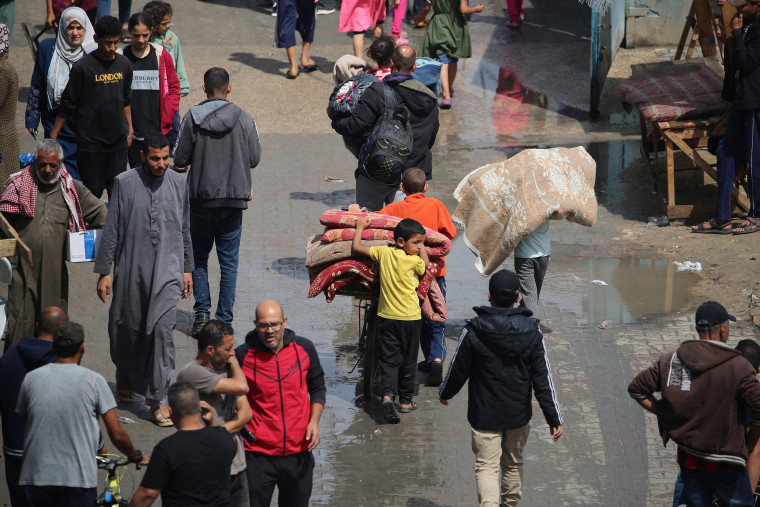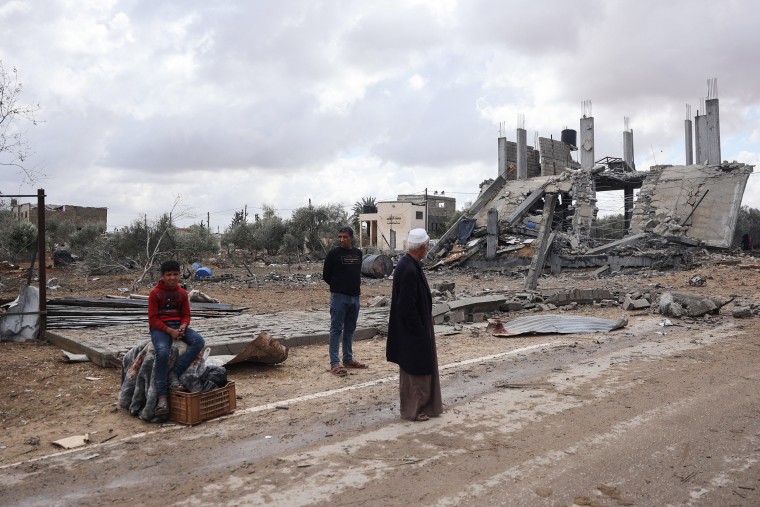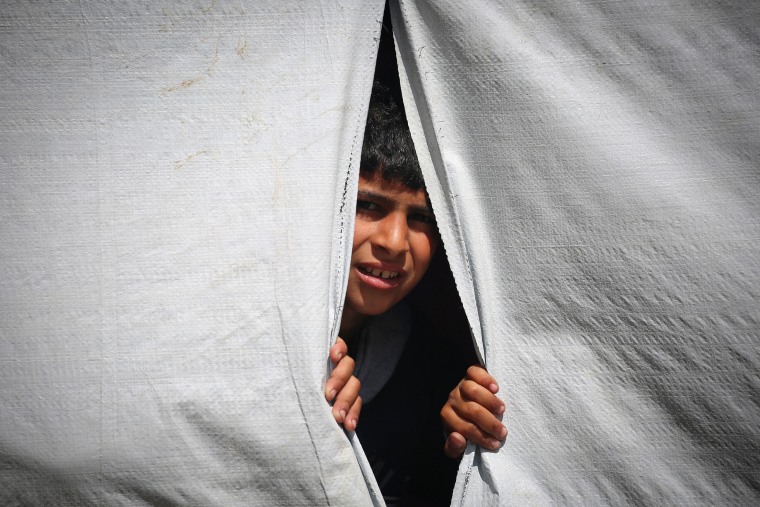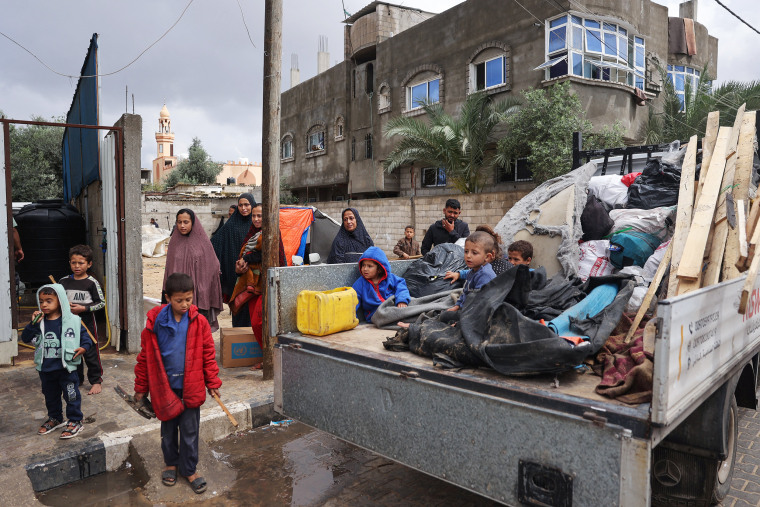Palestinian civilians rushed to flee parts of Rafah on Monday after the Israeli military told some 100,000 people to leave the southern Gaza city, a possible signal that a long-feared ground offensive could be imminent.
The evacuation orders were delivered in leaflets that poured down onto eastern Rafah as rain soaked its crowded streets and ramshackle tents.
“They called us this morning and told us to evacuate the area. Where do we go?” Adham Khalil, who lives in eastern Rafah, told an NBC News’ crew on the ground in Gaza, one of several residents who described a night of intense bombardment followed by fear and uncertainty prompted by the order to move again.
After a night of “shooting, clashes all night and missiles,” Khalil said, his family did not know where to turn. He said he wanted to be assured that a “safe corridor” would be open for them to evacuate.


Others quickly heeded the call.
Families packed their cars and trucks with the few possessions they still had after seven months of war and embarked on what was for many just the latest displacement. Others could be seen driving north, the roofs of their vehicles stacked with mattresses, bundles of blankets and other essentials.
The Israeli military said an estimated 100,000 people were being asked to follow what it said was the “temporary” evacuation of eastern Rafah and move to Al-Mawasi, a nearby coastal area where it promised an “expanded humanitarian area” would await them.
Lt. Col. Nadav Shoshani, an Israel Defense Forces spokesperson, said this was a “limited scope operation” and would not be “wide-scale.”
Israel has said for months that it will launch a ground assault on Rafah, which has swelled to 1.4 million people since the conflict began, to target Hamas leaders, defying pressure from the United States and others who have warned that such an attack threatened devastating consequences for the Palestinians sheltering there, already facing limited food and aid.
The evacuation order followed a Hamas attack launched from Rafah on Sunday that the IDF said killed four Israeli soldiers at a border crossing, though the IDF would not say whether its operation Monday was a response.
The militant group said in a statement that an attack on the city “will not be a picnic” for the Israeli army.
Some analysts speculated that the evacuation orders for eastern Rafah might represent another negotiating tactic in cease-fire talks.
But their impact was not in doubt for residents of Rafah.
“They told us to evacuate, and here we are doing so,” said Mahmood Wahba as he prepared to flee for the city of Khan Younis, near Al-Mawasi.
“We hope that God will bring us goodness, God willing,” he said as he and his family loaded a car with their possessions.
Wahba said his family had heard of the order on the internet, while the IDF had also spread its message through air-dropped flyers, text messages and loudspeakers.


'Worried and afraid'
President Joe Biden spoke with Israeli Prime Minister Benjamin Netanyahu on Monday and “reiterated his clear position on Rafah,” the White House said, as world officials and aid groups urged Israel to halt any plans for a ground assault.
Samah Hadid, a spokesperson for the Norwegian Refugee Council, said she feared the evacuation orders were the “start of the nightmare scenario that we’ve been dreading for months.”
“We’ve been warning against a military operation in Rafah because the consequences will be deadly and devastating for the over 1 million IDPs in the area,” Hadid said in a phone interview early Monday, using the acronym for internally displaced persons.
Hadid also warned that she did not believe the Al-Mawasi area was equipped for a mass influx of people, despite Israel’s assurances that the expanded humanitarian area would include “field hospitals, tents, increased quantities of food, water, medicines and additional supplies.”
Hadid called on the Biden administration to “use its influence and leverage over Israel” to block any military operation in Rafah.
“We need this to happen urgently so that the Israelis get a clear message from their strongest ally that a military offensive in one of the largest displacement sites in the world cannot take place,” she said.
“We have yet to see real pressure applied.”
While Israel has only ordered those in the east of the city to evacuate, Hadid said that this may only be the beginning of a broader effort, a concern echoed by Palestinians in other parts of Rafah.
Abdallah Abujaser, a 22-year-old who had been studying clinical psychology before the war, said that he was just outside the evacuation zone — but feared he, too, would soon be forced to leave.
“Everyone here is worried and afraid,” he said.
Abujaser said he and most others in Gaza are also exhausted as they weigh fleeing once again or facing Israel’s offensive, which local health officials say has already killed more than 34,700 people. Israel launched its assault on Gaza following the Hamas-led Oct. 7 attacks, in which some 1,200 people were killed and 250 others taken hostage into Gaza, according to Israeli officials.
Abujaser called on countries around the world, including the U.S., to do what they can to “stop the war on us.”
“We are not running away from fear. We are running away for life, to secure our lives,” he said.
CORRECTION (May 7, 2024, 9:20 a.m. ET): Due to an editing error, a previous version of this article misstated when the population of Rafah reached 1.4 million people. It is since the Israel-Hamas war started, not before.
